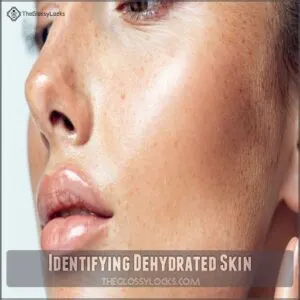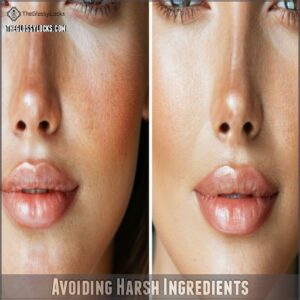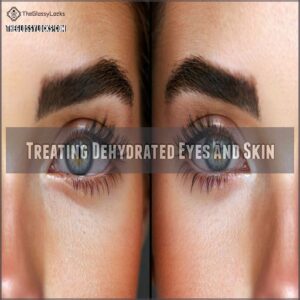This site is supported by our readers. We may earn a commission, at no cost to you, if you purchase through links.

In your skincare routine, use a gentle cleanser to avoid stripping oils, and follow up with a hydrating serum (hyaluronic acid is your MVP here). Lock in moisture with a ceramide-rich moisturizer, and don’t skip sunscreen, even in winter.
Avoid hot showers—they’re comforting but dry your skin out faster than you can say “hydration.” A humidifier can also work wonders, especially in dry weather.
For an extra boost, try weekly moisturizing masks. Want that glow? Consistency is everything!
Table Of Contents
- Key Takeaways
- Identifying Dehydrated Skin
- How to Fix Dehydration Skin
- Skincare Routine for Dehydrated Skin
- Choosing The Right Skincare Products
- Treating Dehydrated Eyes and Skin
- Daily Habits for Skin Hydration
- Maintaining Healthy and Hydrated Skin
- Frequently Asked Questions (FAQs)
- How do you fix dehydration skin?
- What is the best skin care routine for dehydrated skin?
- How can I super hydrate my skin?
- How to quench dehydrated skin?
- Can diet alone improve dehydrated skin?
- How does stress affect skin dehydration levels?
- Are face oils or creams more effective?
- Can dehydration increase skin sensitivity to sunlight?
- How does age impact skin hydration needs?
- Conclusion
Key Takeaways
- Drink more water, eat hydrating foods like cucumbers and watermelon, and avoid hot showers to prevent skin dehydration.
- Use a gentle cleanser, a hyaluronic acid serum, and a ceramide-rich moisturizer in your daily skincare routine.
- Protect your skin with broad-spectrum sunscreen every day and incorporate weekly hydrating masks for extra moisture.
- Avoid harsh products like sulfates, alcohol-based toners, and fragrance-heavy items that strip your skin’s natural oils.
Identifying Dehydrated Skin
It’s easy to confuse dehydrated skin with dryness, but they’re not the same thing.
By learning to spot signs like tightness, dullness, or fine lines, you can take the first step toward healthier, more hydrated skin.
Causes of Dehydration
What’s really causing your dehydrated skin? A mix of factors might be at play:
- Low water intake leaves your skin parched.
- Diet lacking in hydration-rich foods worsens dryness.
- Climate extremes, like cold winters or dry summers, steal moisture.
- Stress can disrupt skin’s balance.
- Medications or genetics may also trigger skin dehydration symptoms.
Tweak these to reclaim your glow!
Symptoms of Dehydration
Dehydrated skin brings symptoms that are hard to miss. You’ll notice tightness, dull complexion, and fine lines becoming more pronounced.
Shadows under your eyes, sunken eyes, and skin dryness symptoms like flaking or discomfort can appear, often accompanied by visible flakiness and dry patches.
The pinch test is helpful—if your skin wrinkles instead of bouncing back, it’s craving hydration. Learn more about hydrating dry skin.
Keep your skin’s water levels balanced to avoid dehydration.
Differences From Dry Skin
While dehydrated skin lacks water, leading to tightness and reduced elasticity.
Dry skin misses natural oils, impacting the skin’s barrier function.
You might notice flaky patches with dry skin, but dehydrated skin shows dullness and uneven texture.
Long-term effects vary—dehydration impacts skin hydration, while dryness can cause roughness. Both need the right moisturizers and a customized skincare routine.
How to Fix Dehydration Skin
Fixing dehydrated skin starts with simple changes like drinking more water and adjusting your skincare routine.
By focusing on hydrating foods, better habits, and gentle products, you can help your skin feel refreshed and look its best.
Lifestyle Changes for Hydration
Several simple lifestyle changes can dramatically improve your skin’s hydration. Boosting your water intake is key; aim for at least eight glasses a day.
Prioritize sleep; those eight hours help your body repair itself, including your skin.
Regular exercise also benefits skin hydration.
- Prioritize sleep quality for better skin hydration.
- Increase your daily water consumption.
- Incorporate regular exercise into your routine.
Hydrating Foods and Drinks
Boost hydration by snacking on water-rich foods like watermelon and cucumbers—they’re not just delicious, they’re skin heroes.
Swap sugary drinks for coconut water or herbal teas; they hydrate without guilt.
Love smoothies? Blend hydrating foods like spinach and pineapple for a tasty glow.
Keep that water bottle close—steady water consumption is your skin’s easiest skincare routine for dry skin.
Skincare Routine Adjustments
To moisturize dehydrated skin effectively, smart adjustments to your skincare routine make a difference:
- Choose gentle cleansers that won’t strip your skin.
- Use a hydrating serum with hyaluronic acid to lock in water – you can find the best hydrating serums online at best hydrating serum.
- Apply a rich moisturizer with ceramides after cleansing.
These tweaks support how to hydrate skin and simplify your dehydrated skin care journey.
Skincare Routine for Dehydrated Skin
A good skincare routine can make all the difference when your skin feels tight, dull, or dry.
Focus on gentle, hydrating products.
hydrating products that lock in moisture and restore your skin’s natural glow.
Morning Skincare Routine
Start your morning skincare routine with a gentle cleanser to refresh and prep your skin.
Follow up with a hydrating serum packed with ingredients like hyaluronic acid.
Next, lock in moisture with a lightweight, hydrating moisturizer suitable for dehydrated skin.
Finish strong with a broad-spectrum sunscreen—your daily shield against UV damage, keeping your skin glowing and hydrated.
Nighttime Skincare Routine
Wrap up your day with a nighttime skincare routine that pampers dehydrated skin.
Begin with gentle cleansing to remove grime.
Then apply a hydrating serum and look for a best night cream to provide an intense dose of hydration.
Use a sleeping mask or layer your best moisturizer for dry skin to lock in hydration.
A touch of oil can enhance bedtime hydration, keeping your skin soft and radiant while you rest.
Essential Skincare Products
After your nighttime routine, pick skincare products that boost hydration and repair.
Look for a serum with hyaluronic acid, a facial oil to seal moisture, and the best moisturizer for dry skin with ceramides or shea butter.
Pair with a moisturizing mask weekly.
Budget choices offer great results—just check for ingredient safety and follow clear application tips for glowing skin.
Choosing The Right Skincare Products
Choosing the right skincare products is key to banishing dehydration. Let’s learn what ingredients to look for—and which ones to avoid—to get that healthy glow back!
Ingredients to Look for in Moisturizers
A great moisturizer for dehydrated skin includes hydration powerhouses. Look for humectants like glycerin and hyaluronic acid that pull water in, emollients like shea butter to lock moisture, and ceramides to rebuild the skin barrier.
- Humectants: Keep your skin plump and hydrated.
- Emollients: Smooth, soften, and seal in moisture.
- Antioxidants: Fight environmental damage.
Benefits of Hyaluronic Acid and Ceramides
Hyaluronic acid benefits your skin by delivering an intense hydration boost, plumping it up and smoothing fine lines.
Ceramides, known for their power, repair your skin barrier and lock in moisture for long-lasting hydration.
Together, they combat dehydrated skin and promote anti-aging effects, giving your skin the glow it craves.
| Ingredient | Key Benefit | Skin Targeted |
|---|---|---|
| Hyaluronic Acid | Intense hydration | Dehydrated |
| Ceramides | Skin barrier repair | Dry/Damaged |
| Vitamin E | Antioxidant support | Sensitive/Inflamed |
| Glycerin | Humectant hydration | Dehydrated |
Avoiding Harsh Ingredients
Great skin hydration tips start with avoiding harsh ingredients.
Skip sulfate-filled cleansers that strip moisture and steer clear of fragrance-heavy products or alcohol-packed toners, which irritate dehydrated skin.
Stick to paraben-free moisturizers for gentle care. Harmful chemicals can wreak havoc on your skin’s balance, so choosing clean, hydrating products will keep your skincare routine dry skin-friendly and effective. Clean, hydrating products are key.
Treating Dehydrated Eyes and Skin
When your skin and eyes feel tight, dull, or extra thirsty, it’s a sign they need some serious hydration.
A few simple changes in your routine can help restore moisture, reduce fine lines, and bring back a healthy glow.
Dehydrated Eyes Symptoms and Treatment
Dehydrated eyes can feel itchy, gritty, and downright uncomfortable, sometimes even messing with your vision. Dryness can also cause dark circles, so incorporating a skin care routine for dark circles under eyes can help.
To fix this, try lubricating eye drops—your go-to for quick relief.
Boost moisture with a humidifier at home and hydrate by drinking water.
If symptoms persist, it might signal underlying causes. Combine these with intense hydration skin tips to repair the dry skin barrier.
Oily Dehydrated Skin Care
Oily dehydrated skin might seem tricky, but balance is key.
Start with a lightweight, water-based serum to boost hydration without clogging pores. Look for oil-balancing formulas with hyaluronic acid.
Weekly masks, like gel-based ones, offer intense hydration.
Stick to a gentle skincare routine for dry skin and avoid harsh cleansers.
Lifestyle impacts matter too—drink water, skip greasy snacks, and glow. Oily dehydrated skin. Gentle skincare routine. Lifestyle impacts.
Reducing Fine Lines and Wrinkles
So, you’ve tackled oily, dehydrated skin? Fantastic! Now let’s fight those pesky fine lines and wrinkles. Remember, prevention is key. Here’s how:
- Slather on sunscreen daily—sun protection is your best friend.
- Boost collagen naturally with a facial massage.
- Consider retinol benefits for wrinkle prevention, and explore a range of retinol serum products to find what works for you.
- Hydrated skin is happy skin, and hydration aids skin regeneration.
Daily Habits for Skin Hydration
Small changes in your daily routine can work wonders for keeping your skin hydrated and glowing.
From drinking enough water to shielding your skin from harsh weather, it’s all about creating habits that protect and nourish.
Drinking Enough Water
Sometimes, staying hydrated feels harder than it should be. But hitting your daily water goals does wonders for your skin health. Think of hydration benefits like softer, plumper skin that glows. Need motivation? Use tracking tips or grab the best water bottles to keep sipping all day. Skip water intake myths—just drink consistently!
| Issue | Solution | Tip | Skin Benefit |
|---|---|---|---|
| Forgetting to drink | Use water-tracking apps | Set hourly reminders | Keeps skin hydrated |
| Boring plain water | Infuse with fruits | Add lemon or cucumber | Refreshes and soothes |
| Always busy | Carry a reusable bottle | Choose a lightweight one | Skin stays plump |
| Unsure of intake | Track glasses daily | Aim for 8 glasses daily | Enhances glow |
Using Facial Sprays and Mists
Facial mists are your hydration lifesaver, instantly revitalizing dehydrated skin. Pick sprays with glycerin or rose water for a dewy boost. Keep one handy throughout the day—easy skincare on the go!
- Hold 8-10 inches away; spray evenly.
- Layer under or over makeup.
- DIY with cucumber or aloe juice.
- Explore brands like Evian or Mario Badescu.
Protecting Skin From Extreme Temperatures
Protecting your skin from extreme climates is a game changer. Cold weather pulls moisture out, leaving dehydrated skin tight, while heat rash strikes in summer.
To combat dehydration, make it a priority to use broad-spectrum sun protection year-round, especially during the winter months.
Combat these environmental factors with sun protection year-round and layer up during winter skincare routines.
Avoid hot showers—they worsen dryness.
Stay consistent with skin protection to handle those temperature fluctuations like a pro.
Maintaining Healthy and Hydrated Skin
Keeping your skin healthy and hydrated takes more than just using the right products.
It’s about building habits like getting enough sleep, staying active, and managing stress to give your skin the care it deserves.
Importance of Sleep and Exercise
So, you’ve mastered the art of staying hydrated throughout the day.
Now, let’s talk about sleep and exercise. Getting enough sleep – quality sleep, that’s – is a game-changer for your skin.
Exercise benefits your entire body, including your skin. It boosts circulation, delivering nutrients and flushing out toxins.
A consistent fitness routine and adequate sleep are key players in skin wellness. The right amount of sleep and exercise impacts hydration levels, keeping dehydrated skin at bay.
Managing Stress for Skin Health
Stress takes a toll on your skin, leading to acne, dullness, and dehydration.
Try yoga for skin health or meditation as effective stress reduction techniques.
Integrate mindful skincare into your routine to nurture dehydrated skin while calming your mind.
Adequate stress management tips, like deep breathing or journaling, boost overall skin wellness, helping you glow from the inside out.
Regular Skincare Routine Tips
Creating a regular skincare routine is the backbone of healthy, hydrated skin.
Focus on cleansing, toning, exfoliating, and moisturizing daily for dehydrated skin solutions.
- Cleanse gently to avoid stripping oils.
- Tone with hydrating products to refresh and balance.
- Exfoliate weekly to remove dull skin.
- Moisturize generously, and pick the best moisturizer for dry skin.
Frequently Asked Questions (FAQs)
How do you fix dehydration skin?
Drink more water, eat hydrating foods like cucumbers and watermelon.
Use products with hyaluronic acid or glycerin.
Add a humidifier, avoid hot showers, and skip harsh cleansers.
Protect your skin with moisturizer daily.
What is the best skin care routine for dehydrated skin?
Think of your skin as a thirsty plant—quench it with gentle cleansers, hydrating serums like hyaluronic acid, lightweight moisturizers, and sunscreen.
Skip hot water, harsh products, and always patch-test new skincare.
Hydrate inside too!
How can I super hydrate my skin?
Want super hydrated skin? Guzzle water, use a humidifier, and slather on hyaluronic acid serums. Add hydrating masks and facial mists to your routine. Your skin will thank you!
How to quench dehydrated skin?
Hydrate your skin by upping your water intake, using a hyaluronic acid serum, and locking in moisture with a quality moisturizer.
Avoid hot water, harsh cleansers, and crank up a humidifier to boost hydration.
Can diet alone improve dehydrated skin?
Fixing dehydrated skin with diet alone is like building a house without tools—it’s part of the solution, not the whole.
Pair water-rich foods with proper skincare and hydration habits for noticeable results.
How does stress affect skin dehydration levels?
Stress messes with your hydration levels by triggering hormones like cortisol, which impacts your skin’s ability to retain water.
It can also make you forget basics like staying hydrated or using your moisturizer consistently.
Are face oils or creams more effective?
They say, "different strokes for different folks," and it’s true here.
Face oils lock in hydration, giving a dewy glow.
Creams hydrate deeply and protect.
Use both together for the ultimate moisture boost.
Can dehydration increase skin sensitivity to sunlight?
Yes, dehydration can make your skin more sensitive to sunlight.
When your skin lacks water, its natural barrier weakens, leaving it vulnerable to UV damage, irritation, and redness.
Hydration helps keep your defenses up.
How does age impact skin hydration needs?
Your skin’s thirst grows with age, like a dry sponge needing more water.
As you age, natural oils decline, so you must hydrate often, use richer moisturizers, and protect your skin from harsh elements.
Conclusion
Remember, radiant skin requires consistent care.
Prioritizing hydration is key to addressing dehydrated skin.
You’ve learned practical tips, from lifestyle changes to skincare adjustments. Now, put your newfound knowledge into practice. Drink plenty of water, use hydrating products, and enjoy the glow!
Consistent effort makes a real difference in how your skin looks and feels. So, embrace these simple steps for healthier, happier skin. Remember, caring for dehydrated skin is an investment in your overall well-being. Hydrating products are important.














